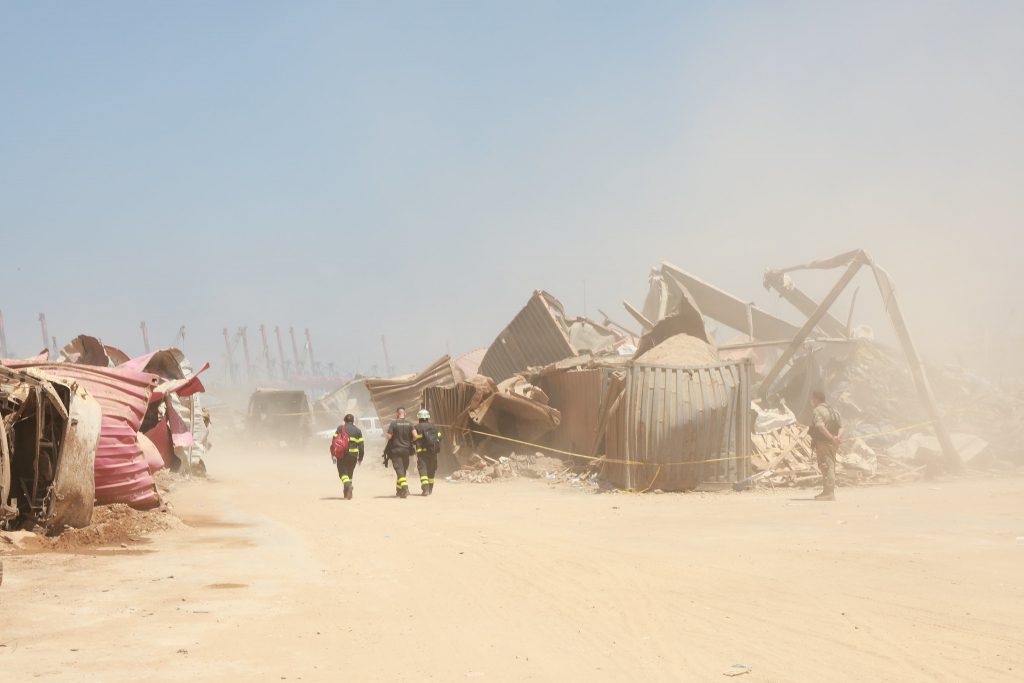Human Rights Watch (HRW) said on Tuesday that senior Lebanese officials failed to take action to protect the public against the highly explosive ammonium nitrate in the Beirut port –the material responsible for the death, damage and destruction on August 4, 2020– despite having known the risks posed by storing it in Hangar 12.
In a new report which emerged as the country approaches the one-year-mark of the blast, HRW found that the very same officials are now thwarting the investigation into the blast, in an attempt to evade accountability. The investigation was set to yield results only five days after the explosion, but one year later, the public is still left without any answers.
Among these officials are President Michel Aoun, ex-Prime Minister Hassan Diab, a former army chief, senior security officials and several ministers who were informed of the risks of storing such material in such close proximity to a densely-populated region in Lebanon.
Aoun has adamantly denied having any such knowledge of the storage of the material at the port, a logistical impossibility considering his high rank.
HRW called for targeted sanctions against these implicated officials, and an international, impartial investigation into the blast. The report spans a whopping 650 pages under the title “They Killed Us from the Inside” and contains scores of documents and exchanges between Lebanese officials that prove their knowledge of the haphazard storage of ammonium nitrate for nearly six years in Hangar 12.
HRW also said some evidence suggests government officials foresaw the possible destruction the highly explosive material could cause and chose to ignore the risk.
“Under domestic law, this could amount to the crime of homicide with probable intent, and/or unintentional homicide,” it added.
HRW claimed that the lack of judicial independence, constitution-imposed immunity for high-level ranking officials, and a range of systematic flaws will render the investigation incapable of “credibly delivering justice” to the victims of the blast.
Groups, organizations and activists, in addition to survivors and families of the victims, have called for an international investigation for months now. Last month, the lead investigating judge Tarek Bitar announced that he intends to pursue senior politicians and former/current security chiefs on the case. All were quick to wield their constitution-protected immunity from the investigation, which has so far prevented them from being persecuted.
Many high-ranking officials, including Parliament Speaker Nabih Berri and ex-Premier Saad Hariri, have recently publicly called for lifting the immunity of all these officials but none have taken further measures.
Aya Majzoub, a researcher on Lebanon at HRW, said to the Associated Press that “all the individuals named in the report knew of the dangers posed by the material and had a responsibility to act and failed to act under international law.”
Last year, it was revealed that the ammonium nitrate arrived in Beirut aboard the Rhosus, which was sailing from Georgia to Mozambique. The ship initially carried 2,750 tonnes of ammonium nitrate. It stopped in Beirut to earn extra money by taking on several pieces of heavy machinery. The crew refused to take it on due to its weight.
The ship failed to pay port fees, and it was later on impounded by the Lebanese authorities. It never left the Beirut port again. The ammonium nitrate was then off-loaded and stored in Hangar 12.
It was revealed earlier last month by Reuters that only around 500 tonnes of the explosive material detonated on August 4, or one fifth of the ship’s original load. The fate of the remaining 2, 250 tonnes remains unknown. HRW, amongst other organizations and news outlets, have failed to conclude whether the shipment was intended for Mozambique or whether this was a guise to off-load the material in Beirut all along.
Evidence still suggests that Lebanese authorities were criminally negligent in their handling of the cargo.
